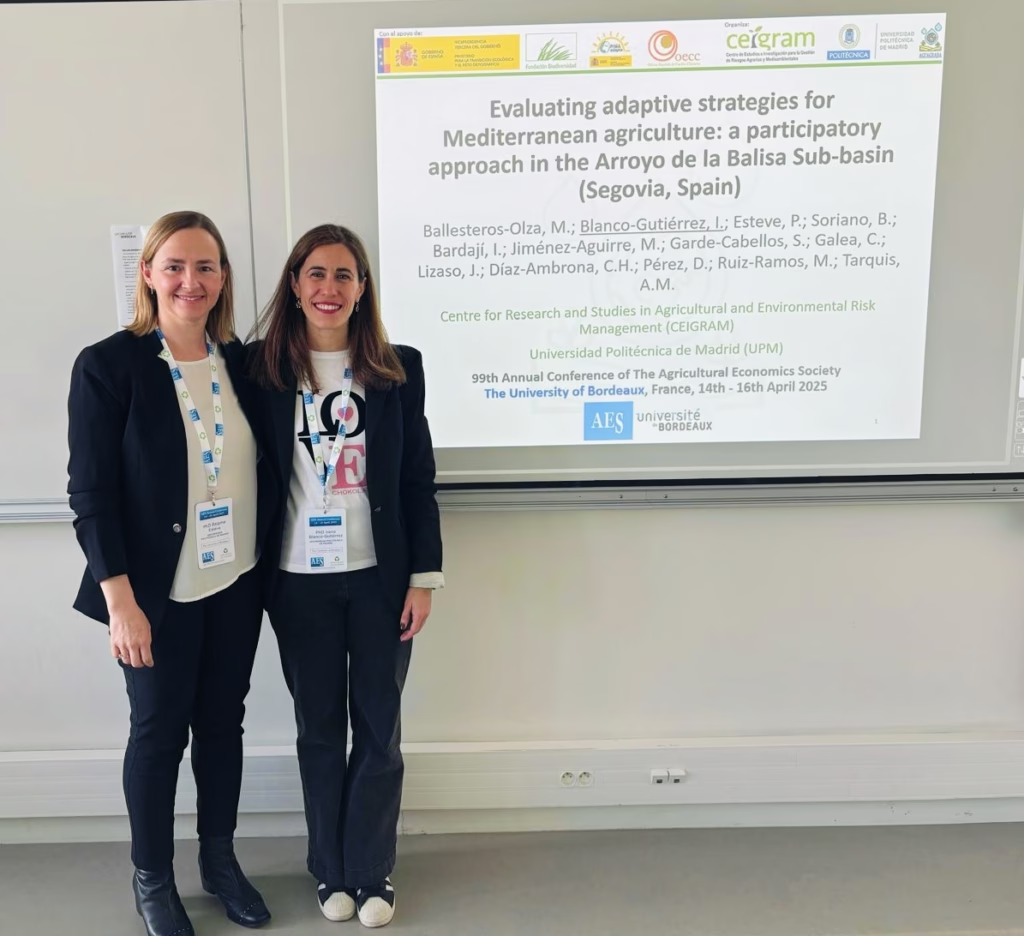Through agronomic modelling, climate scenarios and participatory processes with local actors, AGUAGRADA has taken its proposals for building resilience in Mediterranean agriculture to European and Iberian congresses.
During the month of April, AGUAGRADA has been present in national and international scientific congresses to disseminate the results and methods used during the development of the project, as part of the dissemination and communication actions. The AGUAGRADA team has assessed the demand for agricultural water according to different climate change scenarios and possible adaptation strategies in the sub-basin of the Arroyo de la Balisa, in Segovia.

From 14 to 16 April, Irene Blanco and Paloma Esteve participated in the 99th Annual Conference of the Agricultural Economics Society, held at the University of Bordeaux. In the session on Climate Change Adaptation, Irene Blanco presented the progress of the paper ‘Evaluating adaptive strategies for Mediterranean agriculture: a participatory approach in the Arroyo de la Balisa Sub-basin (Segovia, Spain)’.
The XIII Iberian Congress on Water Management and Planning, organised by IMDEA, USAL and the Fundación Nueva Cultura del Agua, was held in Salamanca from 24 to 26 April, with the theme this year: ‘From scarcity to social and environmental reallocation of water’. In it, Sofía Garde opened the communication session ‘AT2 – Water and Agriculture’, presenting the results of the modelling with Aquacrop in her paper: ‘Assessing the impacts of climate change on rainfed barley yield and water demand in the La Balisa Sub-catchment’.
Mario Ballesteros then presented the results derived from the participatory processes with local actors in his presentation: ‘Prioritisation and socio-economic evaluation of agricultural measures for adaptation to climate change. The case of the Arroyo de la Balisa sub-basin (Segovia). ‘.


Finally, the European Geosciences Union (EGU) held its General Assembly in Vienna during the week of 27 April to 2 May. The aim of the EGU is to provide a forum where scientists can present their work and discuss their ideas with experts from all fields. Due to the large participation in this event, it has become an important exhibitor of CEIGRAM studies, having participated without interruption for more than 15 years.
At EGU 2025, Mario Ballesteros presented the socio-economic evaluation of the adaptation measures collected during the participatory process with local stakeholders in Segovia, in his paper: ‘Building resilience in Mediterranean agriculture through participatory approaches: an evaluation of climate adaptation strategies in the Arroyo de la Balisa Sub-basin’. Maite Jiménez presented the results of the SWAT modelling in a paper entitled: ‘Evaluating Climate Change Impacts on Cereal Yields, Water Balance, and Irrigation Strategies in the La Balisa Sub-Catchment’, through which several future scenarios of climate change in the region have been incorporated and adaptation strategies that can compensate for the pressures that are expected in the future have been proposed.
Participation in AGUAGRADA project conferences has been concentrated in the last few months of the project, with the aim of prioritising the presentation of results in external communication, whether in the area of agronomy or socioeconomics. Once the preliminary results of the research had been compiled, the AGUAGRADA team wanted to share them in order to publicise the proposed adaptation measures and the willingness of local actors to implement these and other measures that could limit the major impacts of climate change in the region.
___
AGUAGRADA is a project led by the Centro de Estudios e Investigación para la Gestión de los Riesgos Agrarios y Medioambientales (CEIGRAM) of the Universidad Politécnica de Madrid, which has the support of the Fundación Biodiversidad of the Ministerio para la Transición Ecológica y el Reto Demográfico, through the Convocatoria de subvenciones para la realización de proyectos que contribuyan a implementar el Plan Nacional de Adaptación al Cambio Climático (2021-2030).




